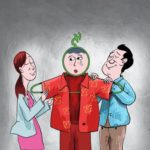Why did Cao Cao like marrying widows?
Cao Cao, a great hero of his generation, was known for his promiscuity in history, marrying many widows as his wives. According to historical records, he married 16 wives and concubines, but 13 of them were widows. So why did Cao Cao like widows? In fact, many people don’t understand and sigh with admiration at his wisdom.

Most of these women became widows because their husbands died or for other reasons, but Cao Cao cared deeply for them.
In ancient society, widows were often considered to have relatively low status and were seen as unlucky. This concept originated from religious and superstitious beliefs, as well as emphasis on family, lineage, and ancestor worship.
Therefore, widows were often seen as bringing bad luck, and society kept a distance from them. This prejudice also led to their exclusion and marginalized social communication.
At the same time, women who became widows due to their husbands’ deaths or other reasons would face financial difficulties. In ancient societies, women often did not have financial independence and relied on their husbands or families.
Once their husbands passed away, they could lose their financial support and their lives could become challenging. Not only that, being excluded and marginalized by society made it harder for them to integrate and socialize.
In addition, widows were also restricted from remarrying. Social awareness and legal systems could view widows who remarry as disloyal, further limiting their choices and freedoms.
The widows whom Cao Cao married also had another characteristic, most of them came from esteemed backgrounds. Such limitations could trap widows in long-term singlehood, increasing financial and social pressures. However, Cao Cao’s attitude towards widows was completely contrary to the social norms of the time.
Cao Cao had a special affection for these women and was willing to marry and take care of them. This behavior was considered rare at that time, and some people found it difficult to understand and criticized him.
Cao Cao had a unique aesthetic requirement and highly valued mature and attractive women, believing that they were more graceful and intelligent. This preference was closely related to his personal character and his political needs.
First and foremost, Cao Cao was an important political and military leader, burdened with significant responsibilities. The mature and charismatic women had often experienced married life and family, meaning they had the ability to handle complex emotions and tasks.
These women might have encountered various challenges in their marriages, which contributed to their maturity and stability. Cao Cao needed a partner to face many different political and military challenges, requiring someone with corresponding intelligence and experience.
As a high-level politician and military commander, Cao Cao carried immense responsibilities. He needed a partner who understood their respective roles and responsibilities.
Therefore, mature and alluring women were more likely to understand Cao Cao’s professional needs, as they played an important role as supportive and understanding individuals, providing valuable opinions and proposals.
Secondly, Cao Cao had a clear sense of inferiority and had a close relationship with his mother, deeply respecting her words and deeds. This complexity might contribute to his preference for mature and attractive women when choosing a spouse, as they had the ability to evoke his filial emotions.

Moreover, this aesthetic preference could be linked to his close relationship with his mother, and he longed for the warmth and security of maternal love in his wife.
Furthermore, as a high-level politician, Cao Cao needed to maintain his political position and stabilize public sentiment.
By marrying widows and taking them as wives, Cao Cao could demonstrate his generosity, tolerance, and gain the favor and support of the people.
This type of marriage alliance was not just a personal emotional choice, but also part of his political strategy. Through these marriages with different forces, Cao Cao could balance political relationships and bring more support and stability to his rule.
Cao Cao admired the wisdom and resilience of these women, while maintaining his political position and stability through such marriage choices. These factors together formed Cao Cao’s unique aesthetic requirements for women.
Cao and his regret about Dinh – The love and remorse until his death
Cao Cao’s life had not been short of beautiful women, and many of them became his wives. However, few have had as much of an impact on Cao Cao as Lady Dinh did. Half a year after Lady Dinh returned to her birth family, Cao Cao thought his wife had forgiven him and went to fetch her home, but with her inherent dignity, Lady Dinh did not show the slightest emotion.
Many historical records note that Cao Cao tried every possible way, from coercion to begging, and even abdicated his throne in an attempt to get his wife back, but Lady Dinh remained resolute. Despite all his efforts, Lady Dinh still did not return, and in the end, Cao Cao had to give up.
However, Lady Dinh continued to live with her parents, working on weaving clothes, and she passed away due to illness. After Lady Dinh’s death, Cao Cao personally chose her burial place.





































